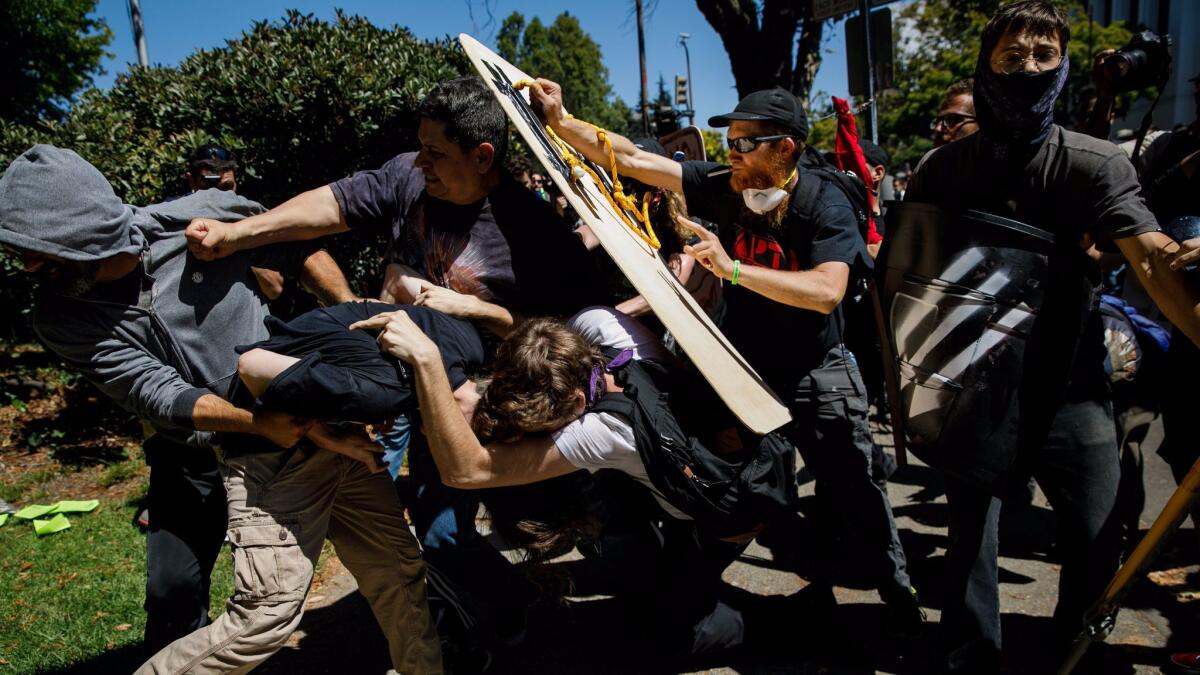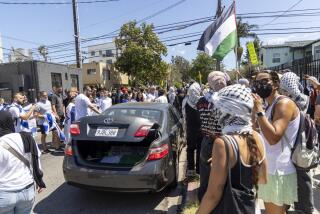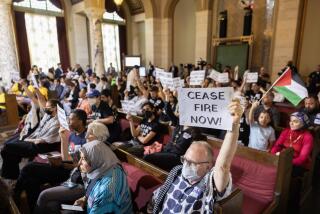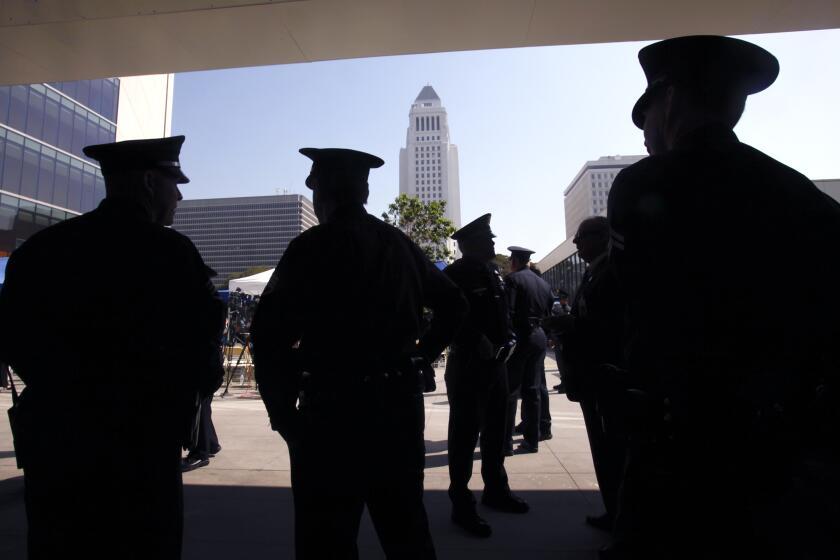L.A. moves to ban pepper spray, tiki torches, gas masks and other items from protests

Alarmed by spasms of violence at protests in Charlottesville, Va., and Berkeley, Los Angeles lawmakers soon could impose new restrictions on what people can bring to public demonstrations and meetings in the city.
L.A. already bans protesters from toting wooden planks more than 2 inches wide and a quarter-inch thick. Under rules proposed by Councilman Mitch Englander, the city also would prohibit such items as pepper spray, water cannons, Tasers, bricks, hammers, cans of spray paint, gas masks, drones or improvised shields made of metal, plastic or wood.
The rules also would ban glass and plastic bottles that are filled with liquids that are alcoholic or not consumable, as well as any toxic waste or caustic or flammable material in any kind of container. And they would bar demonstrators from carrying tiki torches — which were hoisted earlier this year by white nationalists marching at the University of Virginia — near people or buildings.
All of the proposed restrictions would extend to public meetings as well.
The Los Angeles City Council voted Tuesday to ask city attorneys to start drafting the new law, which will come back to the council for final approval. Englander said the lawyers would work closely with the Police Department to finalize the list of banned items before the law is approved.
Englander, a reserve police officer, has raised concerns about protesters and law enforcement being injured at demonstrations elsewhere in the country.
“We don’t have to go far to look at what’s happened,” Englander said at a committee meeting last week, invoking cities including Oakland and Laguna Beach. “We’re looking at best practices.”
He proposed banning specific items from protests — including pepper spray, Tasers and drones — during that committee meeting and said other items could be added based on police recommendations. On Tuesday, Englander amended his proposal to include more than a dozen items, such as gas masks, hammers and improvised shields.
Carol Sobel, a civil rights attorney who repeatedly has sued the city, challenged the legal basis for prohibiting items at protests that otherwise are lawful to possess on the street.
“If it is lawful to have that in your possession while you’re standing on the sidewalk, then what is the difference?” Sobel said, adding that existing laws already restrict other items on the list.
Spray paint, for instance, is banned in L.A. city parks and public buildings with posted signs. And Sobel questioned the proposed ban on improvised shields, saying the only reason to prohibit them would be to ensure that police can use batons and “so-called less lethal weapons” to cause injury.
Peter Bibring, a senior staff attorney at the American Civil Liberties Union of Southern California, raised concerns about banning drones, which sometimes are used by activists to document turnout at protests.
“If the city is going to pass a blanket rule that says you can’t use drones over city streets, that’s one thing,” Bibring said. “But to target protests, in particular, raises 1st Amendment concerns.”
And UCLA law professor Eugene Volokh said that banning pepper spray and other items used for self-defense could discourage people who are smaller or weaker from going to protests, especially if they are unsure that police will protect them.
“It seems to me that you shouldn’t deny people the ability to go to a demonstration and be able to defend themselves against attackers who may be bigger and stronger unless you can really assure them of safety,” Volokh said.
Englander spokesman Colin Sweeney said there weren’t any specific incidents in Los Angeles that had spurred the proposal, but said, “We’re taking proactive steps so that we’re not doing something after something bad has happened.”
At the committee meeting last week, LAPD Deputy Chiefs Bob Green and Horace Frank mentioned an array of weapons that had been brought to protests in other cities, including baseball bats, pipes and hammers.
“Based on what we have seen throughout the country, we think it is good to be prepared,” Green said after the meeting.
Police officers monitoring an event would not be subject to the restrictions, “so they can carry whatever equipment is deemed necessary to secure safety and protect demonstrators,” Sweeney said.
Last week, Englander said the proposed restrictions were similar to rules in Berkeley and Long Beach.
Berkeley — where warring groups of protesters have brawled — imposed temporary restrictions for specific dates and times this year to limit what people could bring into designated areas where violent groups had gathered in the past. Among the banned items were pepper spray and Tasers.
But Berkeley does not have any permanent, blanket restrictions on what people can bring to protests, city spokesman Matthai Chakko said. Long Beach city attorneys and police, in turn, have been discussing possible restrictions but have yet to publicly release a proposal, Long Beach Deputy City Atty. Monica Kilaita said.
L.A. already restricts the possession of some kinds of weapons, including knives and arrows, regardless of whether the owner is at a protest. The city also prohibits people from carrying glass bottles onto public property where permitted community events are being held, with exceptions for medicine, baby formula, food preparation and beverages sold on site.
Prohibited items would include:
- Improvised items used to lock a person to another person or object
- Plastic bottles containing alcohol or non-consumable substances
- Open flame torches near people or structures
- Metal signs
- Metal or plastic pipe longer than 12 inches
- Balloons not filled with air, oxygen or helium
- Bricks, stones or rocks
- Projectile launchers, including water cannons
- Spray paint cans
- Gas masks or similar equipment
- Glass bottles
- Hammers
- Crow bars
- Toxic fluid, gas or solids in any container
- Improvised shields
- Drones
- Pepper spray
- Tasers
Twitter: @LATimesEmily
UPDATES:
6:15 p.m: This article was updated with comment from the ACLU.
This article originally published at 11:50 a.m.
More to Read
Sign up for Essential California
The most important California stories and recommendations in your inbox every morning.
You may occasionally receive promotional content from the Los Angeles Times.











